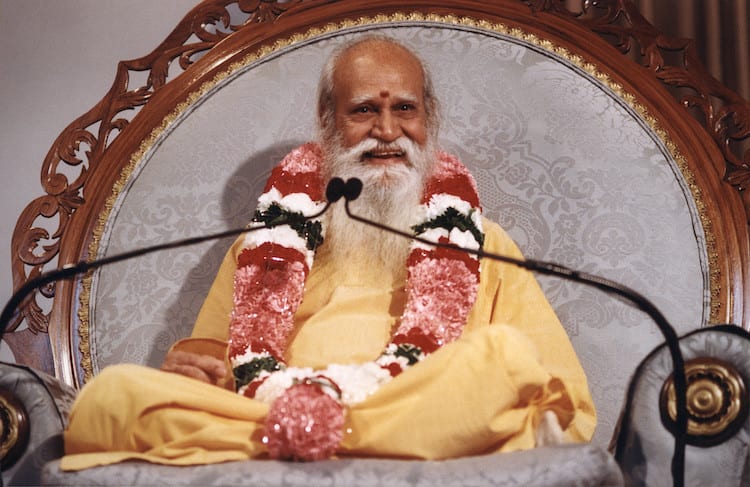“If flowery words make us happy but insults upset us,
we know our minds are not yet strong.”
Tapas is generally misunderstood because it gets translated as mortification or austerity when it actually stands for something different. Tapas means to “burn or create heat.” Anything burned out will be purified. The more you fire gold, for example, the purer it becomes. Each time it goes into the fire, more impurities are removed.
But how can this burning process be affected with our mental impurities? By accepting all the pain that comes even though the nature of the mind is to run after pleasure. Such acceptance makes the mind steady and strong because, although it is easy to give pain to others, it is hard to accept pain without returning it. Such self-discipline obviously cannot be practiced in our meditation rooms but only in our daily lives as we relate with other people.
Tapas also refers to self-discipline. Normally the mind is like a wild horse tied to a chariot. Imagine the body is the chariot; the intelligence is the charioteer; the mind is the reins, and the senses are the horses. The Self or true you is the passenger. And although control of the senses and organs often seems to bring pain in the beginning, it eventually ends in happiness. If tapas is understood in this light we will look forward to pain; we will even thank people who cause it as giving us the opportunity to steady our minds and burn out impurities.
In our lives there are hundreds of opportunities for tapas. Even a cloth must undergo tapas to become clean. What will the laundryman do with the cloth I take him to get cleaned? Will he fold it, put some sandalwood paste and a flower on it and give it back to me? No. First he’ll soak it in boiling water with soap. Then he’ll beat it every which way. Then he’ll tumble and roll and squeeze it in the washing machine. After that he’ll dry it in a hot chamber and iron it. Only then, does the cloth lose all its dirt and grime. It undergoes tapasya to become pure. The laundry man has no hatred for the cloth when he does all these things to it. He only wants to make it pure. It is out of his love that he inflicts pain.
The mind too must be washed, squeezed, tossed, dried and ironed. Don’t think if someone causes us pain they hate us, but rather that they are helping us to purify ourselves. If we can think like this, we are real Yogis. If we understand this point and accept it, we’ll never find fault with anybody who abuses, scolds or insults us. If flowery words make us happy but insults upset us, we know our minds are not yet strong. A word of abuse helps us understand our weaknesses. My Master Swami Sivanandaji said, “Adapt, adjust, accommodate. Bear insult. Bear injury. That is the highest sadhana (spiritual practice).” To go into a corner and say a mantram is easy sadhana. Anyone can do it. But if we are insulted and keep a serene mind, it is higher than saying thousands of rosaries of japa.
Handling things that way takes great courage. A person who can only strike back physically may be physically strong but mentally weak. Mental strength comes by tapasya, accepting pain. Then pain is no longer pain but joy because we have realized the benefit of it. A beautiful example of this is the mother who feels so much joy in bringing forth a child although it may be very painful. She will never avoid that pain; rather she welcomes it knowing it is the price she pays for the great benefit later on.
Question: Gurudev, can there be true God-consciousness even while living and functioning in the physical world, with all its suffering and misery?
Sri Gurudev: God-consciousness, or Samadhi, doesn’t mean that one just sits motionless like a rock! True God-realization involves realizing God right here and now, bringing the knowledge and equanimity gained in silent, mystical communion with the Supreme down to the world. That is Sahaja Samadhi – the natural Samadhi. The realized person remains in constant union, constant identification with God, yet he continues to use his body and mind for the benefit of humanity. We have the mind and body for this purpose – and here we are! The important point is that so long as we are living in this physical world, the mind and body are still subject to the laws of matter.
I know it sounds hard, but we must remember that when we see suffering, it is not the immortal Self that suffers. It is difficult, yet let us remember that it is not our essence – our true identity as children of God – that undergoes anguish and pain. Even a realized person, what we call a Jivanmukta, will have to live out his Karma until he is finally free. That is why great saints like Ramakrishna and Ramana Maharshi experienced cancer. Often I am asked, “Why should such great souls have such horrid disease? – they even appear to have suffered.” The answer is that the Self never had cancer. Their bodies were diseased, their minds experienced profound pain, and yet they themselves were watching – yes, like bystanders.
I saw it myself when I had the great privilege to be with Ramana Maharshi before he left his body. I could barely stand the sight, yet he smiled and teased me and the others as if we were fools. “What kind of Yoga is this, eh?” he would say. “Why do you worry so? This body is just undergoing its Karma.” Occasionally he would cry out in pain – and then he would smile, “Ah, the poor body, it seems to you a heavy burden, eh?” He underwent a cancer operation without any sedatives – a cancer operation! The doctors said it would be impossible without anesthesia. But Ramana Maharshi steadfastly refused. “No. Just do it.” As they were removing the cancer: “Poor arm, tsk, tsk, tsk… I told them not to operate on you but they insisted. Okay. So now you must be strong and accept it.” He spoke with profound compassion, as if he were consoling somebody else. And really he was talking to his own body, telling his own mind. Because he knew that before the cancer, during the cancer and after the cancer he would still be the Self. He had attained this God-conscious state and he rested in that peace. For myself, I could no longer stand the sight of it. I wept and told him so; I told him that I wanted to go. Fourteen days before he left the body, I took leave of him. And he understood; he just nodded his head. I went straight to Rishikesh, and the day I arrived the radio brought the news that Ramana Maharshi had passed away.
Ramana Maharshi witnessed the mental and physical feelings, resting secure in the knowledge that everything in this world must pass away. Through detachment, through constant questioning, we can realize this God-conscious state too. It is our own true and abiding nature. Who am I, having this hunger? Who is this, feeling thirsty? Who is this who feels unhappy: Am I always this way? No? I seem to go through these moods, thoughts, feelings, wants. I experience them – they come and go; “I” remain. So, I am something different than them… This questioning, this detachment is a path towards realizing the true Self.
(Excerpts from Integral Yoga: The Yoga Sutras of Patanjali and from How to Succeed In Yoga and Other Talks both by Sri Swami Satchidananda, reprinted in the February, 2007 IYTA Newsletter)



